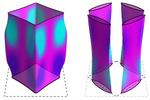Other

“Superconductors – metals in which electricity flows without resistance – hold promise as the defining material of the near future, according to physicist Brad Ramshaw, and are already used in medical imaging machines, drug discovery research and quantum computers being built by …

“If deep space exploration is to become a reality, humans will need to be as self-sufficient as possible. Since ordering supplies from Earth won’t be practical, the astronauts will have to fabricate their own components for equipment and other …
“With a little twist and the turn of a voltage knob, Cornell researchers have shown that a single material system can toggle between two of the wildest states in condensed matter physics: the quantum anomalous Hall insulator and the two-dimensional …
“When it comes to creating next-generation electronics, two-dimensional semiconductors have a big edge. They’re faster, more powerful and more efficient. They’re also incredibly difficult to fabricate. Three-dimensional semiconductor particles have an edge, too – many of them – given their …

“Imagine an iPad or a Kindle for the blind, with inflatable braille that changes shape under a user’s touch. A Cornell-led collaboration has made a crucial component for such a technology: a haptic array of densely packed actuators that …

“Fumbling to find flashlights during blackouts may soon be a distant memory, as quantum computing and artificial intelligence could learn to decipher an electric grid’s problematic quirks and solve system hiccups so fast, humans may not notice. Rather than …

“New research from the College of Engineering aims to ease the process of chemical recycling – an emerging industry that could turn waste products back into natural resources by physically breaking plastic down into the smaller molecules it was originally produced …

“To synthesize plastic, small monomer molecules need to be strung together like beads in a necklace, creating long polymer chains. However, not all plastics – or their polymers – are created equal. The longer and stronger the polymer, the more durable the …

“Cornell researchers are proposing a new way to modulate both the absorptive and the refractive qualities of metamaterials in real time, and their findings open intriguing new opportunities to control, in time and space, the propagation and scattering of waves …

“An interdisciplinary team of Cornell and Harvard University researchers developed a machine learning tool to parse quantum matter and make crucial distinctions in the data, an approach that will help scientists unravel the most confounding phenomena in the subatomic realm …
